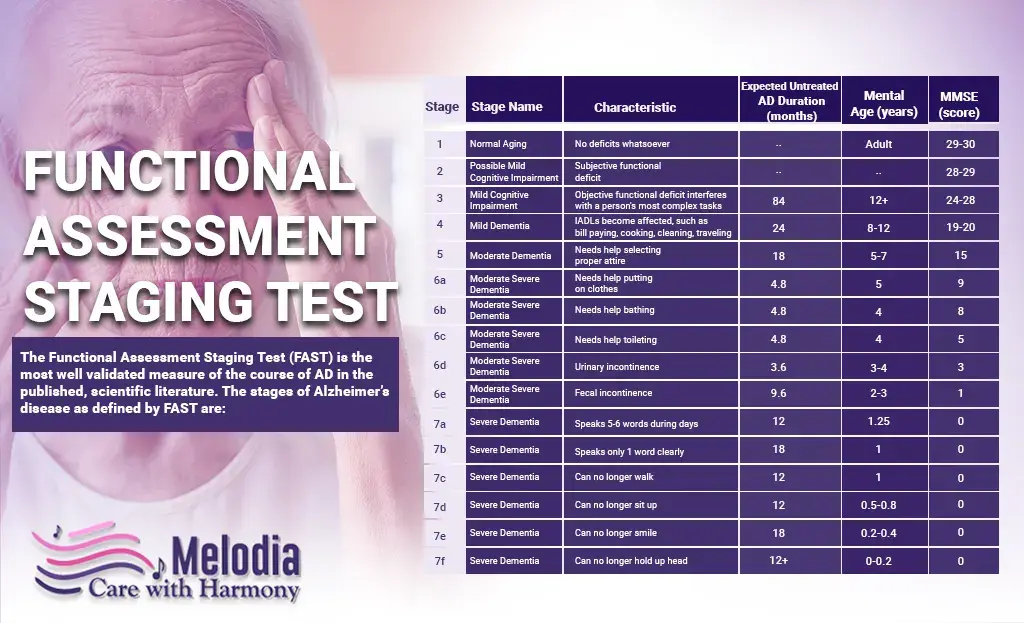The functional assessment staging tool (FAST) is a reliable instrument frequently used to evaluate the active status of dementia in patients. It provides an exhaustive and efficient evaluation of functional ability and the likelihood of functional decline over time. This makes it an invaluable resource for healthcare professionals, carers, and family members to monitor the available capabilities of dementia patients.
What Is the Fast Dementia Rating Scale?

The functional assessment staging scale is one method for determining whether a loved one has dementia. Dr. Reisberg created FAST in 1982 as an available assessment instrument used to define and grade all types of dementia. There are seven steps of FAST:
- No cognitive or functional impairment
- Early functional modifications
- Modest functional declines
- Moderate functional losses
- Moderately severe loss of function
- Severely diminished functional capacity
- Total dependent
The functional assessment instrument evaluates functional abilities, such as physical functional abilities (dressing and hygiene), functional language abilities (memory and recognition), functional activities such as mobility or feeding themselves, and various other tasks.
Families concerned about Alzheimer’s disease and other dementias can use the FAST scale to determine how far along in cognitive decline their loved one is. Understanding a person’s level of functioning can aid in determining the individual’s specific care requirements. It also enables carers to measure changes in a patient’s functional status over time at the earliest possible stage and with the most accurate results.
Understanding the Fast Score for Dementia

The FAST (Functional Assessment Staging) Scale, also called the Reisberg Functional Assessment Staging Scale, is a tool used to assess the functional decline of dementia patients. It was developed by Dr. Barry Reisberg in 1984 and categorized the progression of dementia based on an individual’s ability to conduct daily tasks and activities. The gauge consists of seven stages, with higher backgrounds, indicating more significant functional impairment.
Stages of the FAST Dementia Scale

Here is a breakdown of the stages of the FAST Dementia Scale:
1. Absence of subjective or objective difficulty
2. Complains of forgetting where objects are located; subjective word-finding difficulties
3. Decreased job performance observed by coworkers. Traveling to new locations is arduous. Reduced organizational efficiency
4. Decreased ability to perform complex tasks (e.g., difficulty planning a dinner for visitors, managing personal finances, marketing difficulties, etc.).
5. Requires assistance in selecting appropriate attire for the day, season, or occasion (e.g., a patient may repeatedly wear the same outfit if not supervised).
6a. Improperly putting on clothes without assistance or prompting (e.g., may put street clothes on overnight clothes, put shoes on incorrect feet, or have difficulty buttoning clothing) weekly or more frequently in the past two weeks
6b. Unable to bathe correctly (e.g., difficulty adjusting bathwater temperature) every week or more frequently in the past two weeks
6c. Inability to manage toileting mechanics (e.g., forgets to flush the toilet, does not wipe correctly, or improperly disposes of toilet tissue) occasionally or more frequently in the past few weeks
6d. Occasional or more frequent urinary incontinence in the past few weeks
6e. Occasional or more frequent fecal incontinence in the past few weeks
7a. The capacity to communicate is limited to six or fewer intelligible words on an average day or during an intensive interview.
7b. Speech ability is restricted to using a single intelligible word on an average day or in an intensive interview (the individual may repeat the word repeatedly).
7c. Loss of ambulatory ability (cannot walk without assistance)
7d. Cannot sit up independently
7e. Absence of the power to grin
7f. Loss of ability to alone support the cranium
Understanding a Fast Evaluation
A FAST assessment is indispensable for assisting caregivers in assessing the functional abilities of individuals with dementia and delivering the appropriate care. It is a primary yet highly effective method for evaluating patients’ ability to improve their quality of life.
This scale enables caregivers and healthcare providers to monitor a patient’s functional progress and set goals to enhance patient care. Understanding the FAST Assessment provides valuable insight into dementia patients and ultimately contributes to improved disease outcomes.
Duration of Each Stage

Alzheimer’s disease always follows a clear progression through the FAST scale, with all phases typically occurring in sequence, although there may be an overlap between stages. This is only sometimes the case with other dementias, where patients can bypass steps. For Alzheimer’s patients, the FAST scale provides physicians with an estimated average duration for each stage, but there is no exact science behind the timing. A person’s progression through the locations may be slowed by treatment. The rate at which they ascend the scale will depend on the patient’s condition and the treatment they receive. According to the Alzheimer’s Association, a person with Alzheimer’s lives an average of four to eight years after diagnosis but can live up to 20 years.
Before an individual develops symptoms of Alzheimer’s, the brain may undergo years of subtle changes known as preclinical Alzheimer’s disease. Currently, 5.7 million Americans have Alzheimer’s. The total is projected to reach 14 million by 2050. It is the sixth leading cause of mortality in the United States, killing more individuals than breast and prostate cancer combined. Almost every 65 seconds, one in a hundred patients in the United States is diagnosed with Alzheimer’s disease.
The FAST Scale: Hospice Care Criteria

Alzheimer’s patients who receive palliative care are typically in stage seven. Here, they have considerable difficulties with communication and independent movement. In addition, many Alzheimer’s patients also suffer from other illnesses, such as coronary heart disease. Physicians consider all these factors when determining whether or not a patient qualifies for hospice care. Alzheimer’s patients typically enter hospice care during the final phases of the disease. They typically:
- Need assistance with daily activities and personal care around-the-clock?
- Lose consciousness of recent events and surroundings.
- Changes in physical abilities, including trouble walking, sitting, and swallowing
- Have more communication difficulties?
- Are prone to infections, specifically pneumonia.
In the final phases, patients have difficulty responding to their environment, conversing, and controlling their movements. They may still be able to utter words or phrases, but it can be difficult for them to communicate their suffering or needs. As memory and cognitive abilities decline, patients may undergo significant personality changes and require additional assistance with daily activities.
Utilization of the FAST Score in Hospice Care

The FAST Score is used in hospice care, particularly for patients with advanced Alzheimer’s disease. The FAST Score is a tool that aids medical professionals in assessing functional decline and determining the stage of Alzheimer’s disease. It is designed to monitor the decrease in an individual’s abilities and available capacity as the disease progresses through its various stages.
In multiple ways, the FAST Score can be helpful in hospice care settings:
Patient Evaluation: It assists hospice teams in assessing the current functional status of patients with advanced Alzheimer’s disease. The evaluation can serve as a guide for creating individualized care plans to address particular needs and symptoms.
Prognosis: For advanced Alzheimer’s disease patients, the FAST Score predicts survival. It can be crucial in determining whether hospice care is appropriate for a particular patient.
Care Planning: The FAST Score facilitates the customization of care interventions to suit the needs of patients and their families. Patients may require specialized care and assistance as the disease progresses; the score can help predict these needs.
Communication with Families: The FAST Score can facilitate discussions with families regarding the progression of the disease, treatment options, and the prognosis of the condition. It can help manage the patient’s expectations and ensure his or her wishes and care objectives are respected.
Measuring Outcomes: In hospice care, the FAST Score can be used to assess the efficacy of interventions and to track changes in functional status over time.
It is crucial to note that the FAST Score may be utilized differently in hospice care depending on institution-specific policies, regional practices, and individual patient requirements.
Contact Melodia Hospice Care
If a loved one is progressing along the FAST scale, our hospice care team can help you make decisions regarding their care while they can still provide input. We aim to ensure that these desires are carried out when the time arrives. Contact us at 1- 888 635-6347 to learn how we can assist you and your family in navigating and comprehending the FAST scale as it relates to the hospice journey of your loved one.

